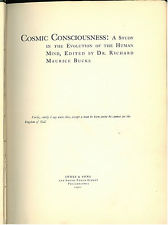Cosmic consciousness

The title page
|
|
| Author | Richard Maurice Bucke |
|---|---|
| Language | English |
| Published | 1901 |
Cosmic Consciousness: A Study in the Evolution of the Human Mind is a 1901 book by Richard Maurice Bucke, a Canadian psychiatrist. In this book, he explored the concept of Cosmic Consciousness, which he defined as "a higher form of consciousness than that possessed by the ordinary man."
In Cosmic Consciousness, Bucke stated that he discerned three forms, or degrees, of consciousness:
According to Bucke,
This consciousness shows the cosmos to consist not of dead matter governed by unconscious, rigid, and unintending law; it shows it on the contrary as entirely immaterial, entirely spiritual and entirely alive; it shows that death is an absurdity, that everyone and everything has eternal life; it shows that the universe is God and that God is the universe, and that no evil ever did or ever will enter into it; a great deal of this is, of course, from the point of view of self consciousness, absurd; it is nevertheless undoubtedly true.
Moores said that Bucke's cosmic consciousness is an interconnected way of seeing things "which is more of an intuitive knowing than it is a factual understanding." Moores pointed out that, for scholars of the purist camp, the experience of cosmic consciousness is incomplete without the element of love, "which is the foundation of mystical consciousness":
Mysticism, then, is the perception of the universe and all of its seemingly disparate entities existing in a unified whole bound together by love.
Juan A. Herrero Brasas said that Bucke's cosmic consciousness refers to the evolution of the intellect, and not to "the ineffable revelation of hidden truths." According to Brasas, it was William James who equated Bucke's cosmic consciousness with mystical experience or mystical consciousness.Gary Lachman notes that today Bucke's experience would most likely be 'explained' by the so-called "God spot," or more generally as a case of temporal lobe epilepsy, but he is sceptical of these and other 'organic' explanations.
Bucke identified only male examples of cosmic consciousness. He believed that women were not likely to have it. (However, there are some women amongst the 'additional cases' listed in the second half of the book.)
He regarded Walt Whitman as "the climax of religious evolution and the harbinger of humanity's future."
According to Michael Robertson, Cosmic Consciousness and William James's book The Varieties of Religious Experience have much in common:
...
Wikipedia
